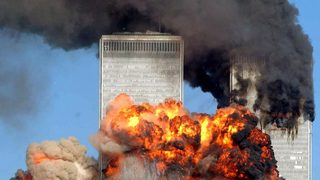
By Amy Goodman with Denis Moynihan
The ninth anniversary of the Sept. 11 attacks on the United States should serve as a moment to reflect on tolerance. It should be a day of peace. Yet the rising anti-Muslim fervor here, together with the continuing U.S. military occupation of Iraq and the escalating war in Afghanistan (and Pakistan), all fuel the belief that the U.S. really is at war with Islam.
Sept. 11, 2001, united the world against terrorism. Everyone, it seemed, was with the United States, standing in solidarity with the victims, with the families who lost loved ones. The day will be remembered for generations to come, for the notorious act of coordinated mass murder. But that was not the first Sept. 11 to be associated with terror:
Sept. 11, 1973, Chile: Democratically elected President Salvadore Allende died in a CIA-backed military coup that ushered in a reign of terror under dictator Augusto Pinochet, in which thousands of Chileans were killed.
Sept. 11, 1977, South Africa: Anti-apartheid leader Stephen Biko was being beaten in a police van. He died the next day.
Sept. 11, 1990, Guatemala: Guatemalan anthropologist Myrna Mack was murdered by the U.S.-backed military.
Sept. 9-13, 1971, New York: The Attica prison uprising occurred, during which New York state troopers killed 39 prisoners and guards and wounded hundreds of others.
Sept. 11, 1988, Haiti: During a mass led by Father Jean-Bertrand Aristide at the St. Jean Bosco Church in Port-au-Prince, right-wing militiamen attacked, killing at least 13 worshippers and injuring at least 77. Aristide would later be twice elected president, only to be ousted in U.S.-supported coup d’etats.
If anything, Sept. 11 is a day to remember the victims of terror, all victims of terror, and to work for peace, like the group September 11th Families for Peaceful Tomorrows. Formed by those who lost loved ones on 9/11/2001, their mission could serve as a national call to action: “[T]o turn our grief into action for peace. By developing and advocating nonviolent options and actions in the pursuit of justice, we hope to break the cycles of violence engendered by war and terrorism. Acknowledging our common experience with all people affected by violence throughout the world, we work to create a safer and more peaceful world for everyone.”
Our “Democracy Now!” news studio was blocks from the twin towers in New York City. We were broadcasting live as they fell. In the days that followed, thousands of fliers went up everywhere, picturing the missing, with phone numbers of family members to call if you recognized someone. These reminded me of the placards carried by the Mothers of the Plaza de Mayo in Argentina. Those are the women, wearing white headscarves, who courageously marched, week after week, carrying pictures of their missing children who disappeared during the military dictatorship there.
I am reminded, as well, by the steady stream of pictures of young people in the military killed in Iraq and in Afghanistan, and now, with increasing frequency (although pictured less in the news), who kill themselves after multiple combat deployments.
For each of the U.S. or NATO casualties, there are literally hundreds of victims in Iraq and Afghanistan whose pictures will never be shown, whose names we will never know.
While angry mobs continue attempts to thwart the building of an Islamic community center in lower Manhattan (in a vacant, long-ignored, damaged building more than two blocks away), an evangelical “minister” in Florida is organizing a Sept. 11 “International Burn the Koran Day.” Gen. David Petraeus has stated that the burning, which has sparked protests around the globe, “could endanger troops.” He is right. But so does blowing up innocent civilians and their homes.
As in Vietnam in the 1960s, Afghanistan has a dedicated, indigenous, armed resistance, and a deeply corrupt group in Kabul masquerading as a central government. The war is bleeding over into a neighboring country, Pakistan, just as the Vietnam War spread into Cambodia and Laos.
Right after Sept. 11, 2001, as thousands gathered in parks around New York City, holding impromptu candlelit vigils, a sticker appeared on signs, placards and benches. It read, “Our grief is not a cry for war.”
This Sept. 11, that message is still—painfully, regrettably—timely.
Let’s make Sept. 11 a day without war.
Amy Goodman is the host of “Democracy Now!,” an independent, daily global TV/radio news hour airing on more than 950 stations in the United States and around the world. She is the author of “Breaking the Sound Barrier,” recently released in paperback and now a New York Times best-seller.
© 2011 Amy Goodman












Media Options